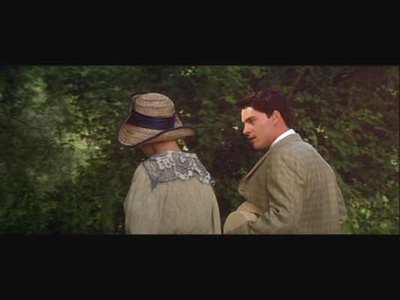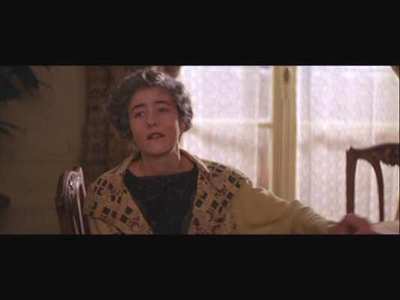Review of Destinées Sentimentales, Les
Introduction
Director Olivier Assayas meticulously brings Jacques Chardonne`s novel to the big screen in this three-hour epic about life, love, religion and regret.
The story centres around three main characters in early 20th Century French high society - Jean Barnery (Charles Berling), his first wife Nathalie (Isabelle Huppert) and his second wife, Pauline (Emmanuel Beart).
Jean Barnery is the son of an extremely wealthy, high-quality porcelain manufacturer in Limoges, France. Rather than take the reins of the family business though, Jean decides on a simpler life as minister to a small Protestant community in the village of Barbazac.
He is unhappily married to Nathalie, a troubled and very difficult woman and the couple become the talk of the village when he sends her and their daughter into exile after rumours of her infidelity.
Local cognac producer Phillipe Pommerel (Olivier Perrier) supports him through these difficult times and when the gossip subsides the community quickly forgives the popular minister.
Pommerel`s niece, Pauline has also returned to Barbazac after two years in England and the pair find themselves becoming increasingly attracted to each other.
Barnery is racked with guilt though. The year is 1900 and divorce is almost unheard of. He is a man of the church and should be setting an example where marital vows are concerned, not estranged from his wife and child.
So, when Pommerel returns from a failed attempt to persuade Robert`s uncle in Limoges to invest in his ailing business, he brings a letter from Nathalie and news of her depreciating mental health.
Against Pommerel`s advice, Barnery sends for his wife and child and the couple briefly reunite until Barnery can stand it no more and files for divorce.
Pauline has since fled to Paris and this recent scandal proves too much for Barnery`s career and conscience. He leaves everything to Nathalie including his shares in the company, purely to appease his guilty mind of his failed career and failed marriage.
Nathalie moves to Paris and Jean oversees this, taking ill in the process. He is visited by Pauline who persuades him to visit the Swiss mountains for health reasons and the couple quickly become intoxicated by each other amidst their idyllic, mountain top surroundings.
The couple remain in Switzerland and in solitude for many years, hopelessly in love they have a son and are totally dependent on each other, returning to Limoges only when Jean`s uncle dies and he is pressured by his family to take control of the company.
Life`s not so idyllic in Limoges though. Jean is constantly fighting to stay ahead of business competitors and his picketing workforce, he still carries the guilt from his first marriage and now he`s been called for battle in WWI.
War takes its toll on him and he returns a distant, noticeably different man, but now he must begin his own battles and rediscover his daughter, rekindle the love he once had for Pauline and revive the recession-hit fortunes of Barnery Porcelain.

Video
Non-anamorphic 2.40:1. I think the picture quality is generally good although can be a bit grainy and off colour sometimes, especially if you try different viewing size options. You don`t really care too much though as the scenery is so good.

Audio
Dolby Digital 2.0 stereo. Good.

Features
Theatrical Trailer
Subtitles Options

Conclusion
It would be more than a little unfair of me to slate this film simply because it`s not the type of film I would usually go for.
This is a beautifully shot film, the scenery is stunning and the waltz scene in particular really give the audience a feel for the lifestyle of the characters and the period in time that the director is trying to reflect.
Costume design also goes a long way to capturing the period; I really like the way that the aristocratic Parisian youth were portrayed as Barnery`s daughter reaches her late teens.
Casting is also very good with the three main characters in the film all doing a very good job.
Other than a couple of Luc Besson`s films I am unfamiliar with French cinema and French actors, but I thought Isabelle Huppert as Nathalie was fantastic in this. Her character is slightly disturbed and she leaves you with absolutely no doubt how difficult it would be to live with someone of her frame of mind.
I also enjoyed the performance of Charles Berling, especially when he returns from war as a totally changed man. He`s a fairly likeable and strong character throughout the movie although he can be a little cold at times - on his return this is magnified hugely and he becomes isolated and uninterested in his family.
Emmanuele Beart is a breath of fresh air as the free-spirited young girl when she first comes into this film. Beautiful with no religious beliefs and a strong desire to work and make her own way in life, she is an interesting character who you firmly believe would have overwhelming seductive qualities over most men she came into contact with. However, her character completely changes when she falls so deeply in love in Switzerland and she struggles slightly to convince as an older, devoted wife.
There are also excellent performances from two of the supporting cast, Olivier Perrier and Dominique Reymond.
Reymond plays Julie. She`s one of those strong women who is really the backbone of the entire Barnery empire and could easily run the family business if she wanted but, probably, because of her gender is unable to.
I think she should have featured in the film a whole lot more but, for me, that`s one of the film`s big faults.
Characters come and go inexplicably. For instance, in the early part of the film the character who allegedly had the affair with Nathalie appears at the dance and makes a beeline for Pauline.
Every man at the dance has their eyes on her at this stage as she`s young, beautiful, slightly wild and fresh off the boat from an adventure in England.
He`s a bit of a handsome cad and is very insistent on dancing with her. She refuses, but somewhat reluctantly, and you feel that he is going to be a spanner in the works of the future relationship between Barnery and Pauline, but you never see or hear of him again.
You also have no idea that the couple have had a son in Switzerland until Jean is introduced to his nephew at his uncle`s funeral and he says that his son Max is of the same age.
Apart from it being too long and short of even one edge-of-your seat moment, the film is also very sketchy.
It begins in 1900 and finishes sometime after the famous stock market crash of 1929, but it is unclear and very hard to keep track of just exactly what year it is.
It only feels like Jean has been back from WWI for five minutes and they`re facing the recession.
I really liked the story though and I realise that it`s not supposed to be the most exciting of films, and that it`s really about love being the most important thing in life. I would have really liked to see more of Jean at war though and the reasons for why he returned as such an automaton.
It reminds me of one of those huge epic series that used to be on television when I was a child, something like The Thorn Birds.
And like the Thorn Birds, it was good at the time, but I wouldn`t go through it again.
Your Opinions and Comments
Be the first to post a comment!